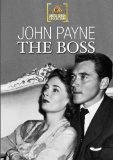| Reviews & Columns |
|
Reviews DVD TV on DVD Blu-ray 4K UHD International DVDs In Theaters Reviews by Studio Video Games Features Collector Series DVDs Easter Egg Database Interviews DVD Talk Radio Feature Articles Columns Anime Talk DVD Savant Horror DVDs The M.O.D. Squad Art House HD Talk Silent DVD
|
DVD Talk Forum |
|
|
| Resources |
|
DVD Price Search Customer Service #'s RCE Info Links |
|
Columns
|
|
|
Boss (1956), The
Coarse, vital, low-budget crime meller. M-G-M's Limited Edition Collection of M.O.D. (manufactured on demand) discs has released The Boss, the 1956 crime drama starring John Payne, directed by Byron Haskin, from a script by blacklisted writer Dalton Trumbo (under the pseudonym Ben L. Perry). The full-screen print is exceedingly rough here, and that soundtrack is almost a deal-breaker...but the The Boss is so involving, you eventually put aside the limitations of the original materials used here for the transfer. No extras this time around.
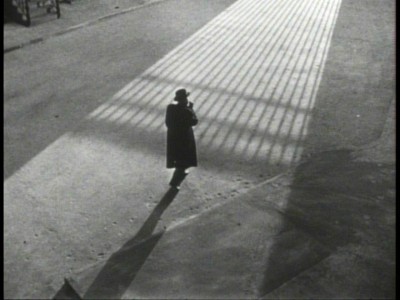
1919: the doughboys come back home. In an unnamed Midwestern city, Captain Matt Brady (John Payne) heads a welcome home parade for the city's returning veterans. His childhood friend, Sergeant Bob Herrick (William Bishop), marches behind him, defending Matt's name when a fellow soldier expresses a wish to finally knock the Captain's block off. Bob warns the soldier that Matt has never lost a fight―prophetic words that signal the ruthless life, and eventual downfall, of Captain Brady. Refusing to be bought off by his disapproving brother, Tim Brady (Roy Roberts), the city's "political boss" and fixer, Matt vows to go his own way, never again letting anyone tell him what to do. Hoping to marry his sweetheart, schoolteacher Elsie Reynolds (Doe Avedon), Matt is 86ed out of his date by crafty friend Bob, who also has designs on the pretty girl. Enraged at not only Bob's trick of getting him drunk and missing the date, but also at Elsie's "good-girl" proper refusal to see the drunken Matt, Matt throws his marriage proposal back in her face and promptly grabs the first woman he meets and marries her: beat-up stray Lorry Reed (Gloria McGehee).
Such an impetuous act doesn't go down well with brother Tim, who promptly collapses and dies after a heated argument with Matt over this politically disastrous marriage. Fade to two years later. Matt is now the city's "boss," and he wants Bob in with him as a loyal lieutenant. Everything looks jake for Matt, but trouble is forming on all sides for the cocky, arrogant wheeler-dealer. Reformer Stanley Millard (Rhys Williams), further spurred on to action by Matt's corrupt dealings with his brother, vows to bring Matt down. And that shouldn't be too hard, since Matt has gotten into bed with Johnny Mazia (Robin Morse) and "the boys" when he needs fast cash after the stock market crash. With Johnny's association, Matt can add murder to his repertoire of political fixing, voter fraud, graft, corruption...and the equally heinous crime of rejecting the loyalty and love of sad Lorry, who's fully aware of Matt's designs on Elsie.
MAJOR PLOT SPOILERS WARNING!
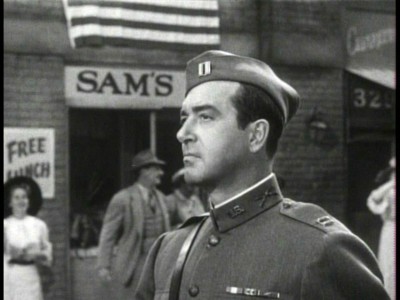
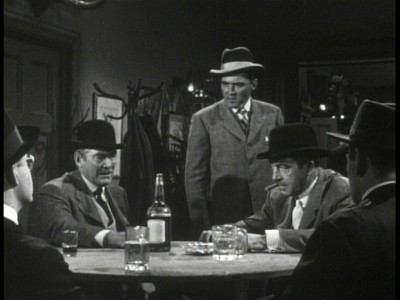
I hadn't caught The Boss until this M-G-M M.O.D. disc came my way, but I had read about it, and it more than lived up to its minor cult status. Scripted by blacklisted writer Dalton Trumbo (Spartacus, Roman Holiday), using scripter Ben Perry's name as a front, and directed by solid journeyman Byron Haskin (War of the Worlds, The Naked Jungle, Robinson Crusoe on Mars), The Boss is lean and crude and tough, wasting not a frame of its low, low budget in getting on with its epic-sized story that mixes gangsterism and politics with a moxie that reminded me of bigger, better-known classics like The Roaring Twenties and The Godfather, Part II. Released in 1956 when, according to the facile, accepted (and completely incorrect) viewpoint today that mainstream 1950s American pop culture brooked no self-criticism, The Boss is lousy with beefs against the then-current status quo...even if it slyly sets its story back a few decades in American history, disingenuously claiming at the beginning in a title card reminiscent of all those old gangster movies, that America had already cleaned up its criminal "boss" mess. The Boss may be a fictionalization of a real political criminal in American history (Tom Pendergast of the Kansas City "machine"); however, its unflinching acknowledgment of the completely incestuous and corrupt relationship between U.S. politics, business and law enforcement, with voter fraud, backroom sweetheart deals, influence peddling, and muscle-as-a-first-resort to getting business done as its tools of the trade, was as timely in 1956 as it is today (maybe even more so today, considering...).
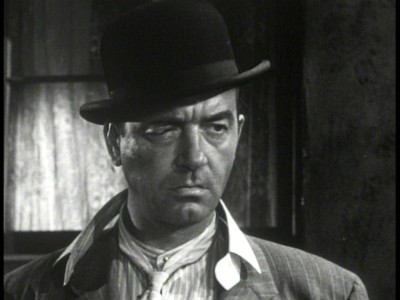
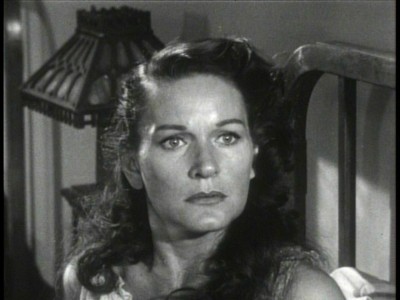
Filling out this exciting, fast-moving corrupt story, Trumbo creates a vivid monster in John Payne's Matt Brady, a psychological portrait of a completely amoral, self-obsessed man-eater that's brought to startling life by the gifted, underrated Payne. Setting up Matt as a winner who won't know what to do if he ever loses (foreshadowed by his rueful fixer brother Tim), what Matt seemingly hates in his brother―a striving for power―he automatically assumes for himself once he feels responsible for his brother's heart attack (after they argue over Matt's marriage). Unfettered now by any lingering feelings of opposing his more-powerful brother's influence, Matt can now "flower" into a complete moral degenerate, stomping on anyone who gets in his way (Trumbo creates a memorable revengeful moment when Matt, blackballed by the local country club, orders his city manager to divert a sewage run-off through the club's creek; once membership drops, he'll then have it condemned). The treatment of his character is completely unsentimental, as well. We keep expecting Matt to ultimately reform under Lorry's unconditional, sad love, but he refuses. In fact, when he's at his lowest after the market crash of '29, and she offers succor, he throws it back in her face, fearing she's trying to make a fool of him. Trumbo offers no life line, no small saving graces for this animal; Matt literally forced Lorry, a stranger, to marry him at a moment's notice out of the sheer power of his rage, and once he's brought down by a lying best friend Bob, we don't feel sorry for him at all. He loses everything, all of his illusions: his political power, his "friends," and Lorry. Faced with the shadows of the prison bars he'll soon enter, he drops his last token of who and what he is: his expensive cigar (calling Dr. Freud).
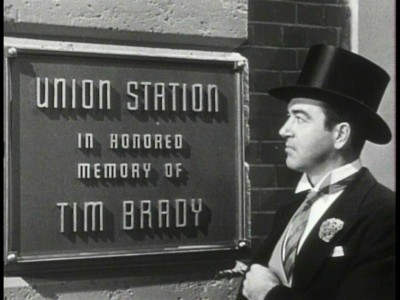
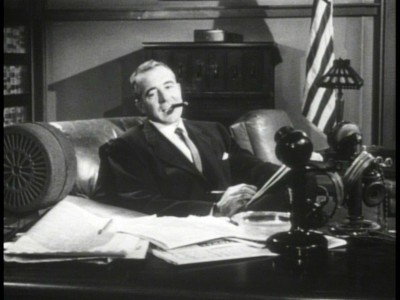
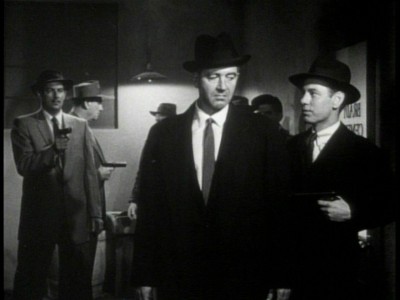
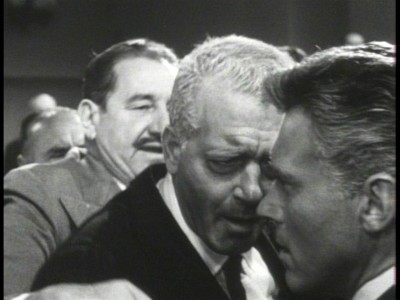
The DVD:
The Video:
The full-screen, 1.33:1 black and white transfer for The Boss is pretty dreadful: tons of screen anomalies (scratches and tears), blown-out contrast, and weak blacks. As well, if you matte this out to some approximation of the original widescreen ratio it was probably projected at in 1956 (1.66:1 looked good for framing), you blow the grain out completely. To be fair, though, this may be the best original element that's available for this marginal title.
The Audio:
The Dolby Digital English mono audio track is even worse: this could be a deal-breaker for a lot of buyers. There is a persistent, loud hum that's laid over the entire track that you have to get your mind around before you can start to enjoy the picture. It's annoying as hell, and more than once I had to back up a scene to understand the dialogue...which is muddy. However...the picture is so good, you'll eventually make your peace with this glitch.
The Extras:
No extras this time for The Boss.
Final Thoughts:
Sensational little programmer from writer Dalton Trumbo and director Byron Haskin, featuring one of John Payne's best performances. The Boss plays like a mini-The Godfather, Part II, painting a crude, epic sweep of a story that details the corruption that's endemic to American politics. One of the best "B" movies of the 1950s, The Boss would have received our highest award here at DVDTalk―the DVD Talk Collector Series―for content alone. However, the original materials used here for the transfer are pretty bad, and the soundtrack glitch is almost unbearable. Still, it's such a superior film, I'm highly recommending The Boss.
Paul Mavis is an internationally published film and television historian, a member of the Online Film Critics Society, and the author of The Espionage Filmography.

 ">
">
|
| Popular Reviews |
| Sponsored Links |
|
|
| Sponsored Links |
|
|
| Release List | Reviews | Shop | Newsletter | Forum | DVD Giveaways | Blu-Ray | Advertise |
|
Copyright 2024 DVDTalk.com All Rights Reserved. Legal Info, Privacy Policy, Terms of Use,
Manage Preferences,
Your Privacy Choices | |||||||









